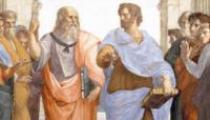1. Why discuss the virtues?
St Thomas Aquinas: 'Every moral question can be reduced to the consideration of the virtues.' (Preface to Summa Theologica 11-11)
2. What are the virtues in general?
The human expedience which the word 'virtue' describes is: 'an habitual and firm disposition to do the good. It allows the person not only to perform good acts, but to give the best of himself The virtuous person tends towards the good with all his sensory and spiritual powers; he pursues the good and chooses it in his concrete actions.' (Catechism of the Catholic Church # 1803)
The Latin word virtus is a word of broad meaning: it denotes both physical and moral strength or courage and connotes some power at the disposal of the human being. Perhaps this is a more attractive image of virtue for our time: it is not merely a good habit, but the innate power of the human being to pursue what leads to true human happiness. The Book of Wisdom, written c. Is' century BC, says: "If anyone loves righteousness, Wisdom's labours are virtues; for she teaches temperance and prudence, justice, and courage.' (Wis 8:7). It was St Ambrose (Expositio in lucam, PL 15, 1653) who first called the four fundamental human virtues the 'cardinal virtues', from the Latin cardo meaning' hinge' or 'pivot'. The cardinal natural virtues are to be distinguished, though not separated from, the theological virtues of faith, hope and love.
3. Prudence
Aquinas, drawing on Aristotle, says that prudence is 'right reason in action'. It is the foundational trait of the person seeking to live the good life. In Latin, prudence was described as the auriga virtutum, 'charioteer of the virtues'. Prudence applies moral principles to particular circumstances and helps us to overcome doubts about the good to be achieved and the evil to be avoided. Prudence is the middle-path between rashness and indecision. The more prudent a person becomes, the more easily and quickly he or she will be able to size up a situation and make an appropriate decision. The Book of Proverbs contains a neat little saying which sums up prudence: 'the prudent man looks where he is going.' (Prov 14:15) Aquinas also describes prudence as 'nimbleness' of moral decision-making and action.
Conscience makes an intellectual judgment about the moral quality of a possible action. Prudence is the power, habit or skill which enables a person to put that judgment into practice in the concrete circumstances in the most appropriate way. A prudent person will more easily avoid actions which his or her conscience judges to be morally bad. Of perhaps more importance, though, are situations in which the conscience judges a number of possible actions to be morally good in themselves. Here, the prudent person must ask which good action is the most appropriate.
An important element of prudence is the willingness to seek the advice of other wise or prudent people. The Catholic spiritual tradition embraces this particularly in the sacrament of reconciliation and in spiritual direction.
4. Fortitude
Fortitude is the virtue that ensures firmness in difficulties and constancy in the pursuit of the good. Fortitude underlies the exercise of freedom. To say that fortitude is a virtue is to recognise that human beings are not invincible; we are vulnerable. Neither our physical nor moral strength is absolute; every day we face situations which seem to threaten our integrity as embodied spirits in the world. The virtue of fortitude thus describes the curious fact that the human being recognises danger and feels fear or anxiety and yet is not a slave to it.
Fortitude describes a habit of steering a middle path between foolhardiness and cowardice. What appears externally to be an act of bravery is not really an exercise of the virtue of fortitude if it is simply an unreflected or irrational action. Similarly, what appears externally as heroic passive resistance or 'turning the other cheek' is not really an exercise of fortitude if fear is the motivating factor. Internal states, the exercise of the moral power of the person is essential to the virtues, not only the external action or its result. The martyrdom of St Maximilian Kolbe may be seen as an example of a supreme exercise of fortitude (not to mention, love) based on long-practice of the habit. Such acts of heroic fortitude are based on the gradual, life-long practice of the virtue.
5. Temperance
The primary meaning of temperantia is simply 'moderation' or 'self-control'. Temperance does not consist in a rejection of or a sort of Stoic indifference to the use of good things in this world. A person practised in temperance will know when, for example, a situation calls for enthusiasm and a wholehearted use of God's gifts. It should not be confused with popular notions of total abstinence from alcohol.
On one definition, temperance is the virtue which regulates the use of sensible pleasures. But this really is too narrow, the mainstream Catholic philosophical tradition holds that temperance is also required with regard to spiritual practices such as penance and fasting. Aquinas even recognised that there could be an intemperate attitude to study which he termed curiositas. In this world, at least, the goal of temperance is 'inner harmony', to use a phrase which might make more sense to our contemporaries. In every case, then, the underlying question which the temperate person asks him or herself is: how does the use of this good thing whether it be food, drink, sport, sex, study, music, properly express my true dignity as a loving and rational human being? For the Christian believer, this question will really be directed by the goal of the human being, which is the communion of heaven.
6. Justice
Justice may be defined as the power or habit whereby a person renders to each his due with constant and firm will. For human beings justice is perhaps the most difficult of the virtues, since it is the attitude of mind and heart which is constantly looking towards the good of others. Naturally, by giving to others what is their due, we do good to ourselves, but this self-good is not the primary focus of the just person.
Justice is the only one of the four cardinal virtues which the Scriptures regularly apply to God. Although God does not, strictly speaking, owe anything to anyone. his justice consists in a firm and constant adherence to what he has freely and lovingly promised to his creatures. God delights in pouring out his gifts in fulfilment of his promises. Thus, the highest praise which the Scriptures can give to a human being is to describe him or her as 'just'.
The concept of justice depends on the idea that God and persons have 'rights'. In other words, justice consists in rendering to persons what is rightfully due to them. The virtue of justice does not strictly speaking refer to the decision about whether a person is due something. Rather, the question whether a right exists is really a question for the intellect. The just person knows what is due to others, renders what is due, and does so with the right internal motivation. Aquinas saw promptness and pleasure in rendering what is due as the hallmarks of the truly just person.
7. Putting the virtues back together: Virtue ethics
Moral philosophy has generally held that the cardinal virtues come as 'package deal'. In other words, it is difficult to imagine a person who had one of these fundamental moral powers or habits and not the others. This makes sense, of course. Each of the individual virtues is really describing a person's moral character from a particular perspective. Indeed, one of the strengths of a moral philosophy based on the virtues is the very fact that it insists that we focus, not so much on this or that particular action but on the character of the whole person. This sort of moral philosophy is often called 'virtue ethics'.
One of Aquinas' most important contributions to moral philosophy is his insistence that human beings in a sense 'create' themselves. Of course, all human beings share in a human nature. But this simply means that our nature is not only material and biological but also rational - it is our nature to know and to will. The idea that we each create our true and best selves throughout our lives is something which ought to appeal to our contemporaries and especially to young people.
The virtues are analogous to other human powers: each of us has a certain innate physical power or intellectual power, but we can increase those powers by exercising them. Going to the gym increases physical power., study increases intellectual power. And, in fact, the relationship is circular: as our physical strength or skill increases it enables us to perform at a higher level. We can lift heavier weights, or run or swim faster. As our intellectual power increases in a particular field, we find it easier to absorb and understand more and more difficult material. Similarly with the virtues: they are both the 'fruit and seed of morally good acts', as the Catechism puts it. Now, by a morally good act we mean any action which is performed for the purpose of some true end of human flourishing. So, in other words, when 1 perform a morally good act 1 am simultaneously exercising my moral power or virtue and strengthening it. Virtue is the fruit of good acts because our moral power is strengthened by exercise. Virtue is the seed of good acts because a strong moral power makes the pursuit of the good easier in future. In fact, we create in ourselves a stronger and stronger tendency towards the good.




